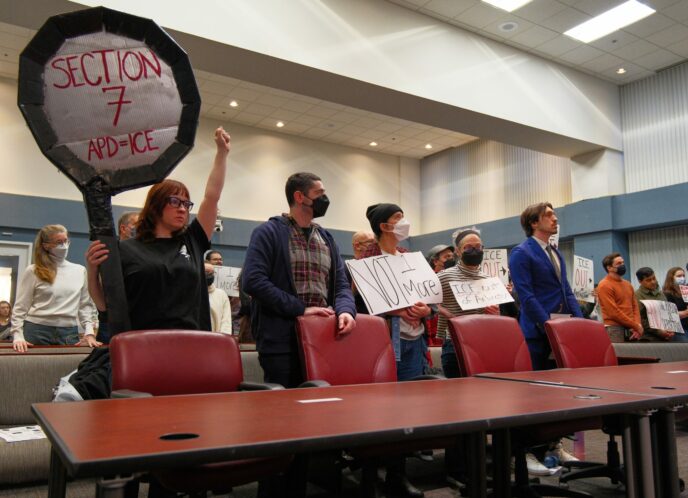Just Futures Law, MediaJustice, Mijente, Immigrant Defense Project and Electronic Frontier Foundation say public must know details of COVID-19 related data collection and sharing
San Francisco – The Electronic Frontier Foundation (EFF) is representing four racial and immigrant justice groups— Just Futures Law, MediaJustice, Mijente Support Committee, and the Immigrant Defense Project—suing the U.S. Departments of Homeland Security and Health and Human Services under the Freedom of Information Act (FOIA) for withholding critical records about the collection and sharing of data during the COVID-19 pandemic.
The four groups all filed FOIA requests for information about COVID-related surveillance and data analysis last year. In particular, the groups are worried about HHS Protect, a vast secretive data platform designed by controversial data software company Palantir. Palantir has a long history of building surveillance systems for the Department of Homeland Security that facilitate criminal prosecutions, family separation, and raids that lead to detention and deportation. In July of last year, the government required all hospitals to report COVID-19 infection data to HHS Protect, instead of the system operated by the Centers for Disease Control.
However, the public has little to no information about COVID-19 data collection and tracking, including on the more than 200 data sources included in HHS Protect. The plaintiffs in this case asked both the Department of Homeland Security and the Department of Health and Human Services for any records describing the data sources, as well as limits on the use of data collected and the duration of retention, but have yet to receive anything responsive to their requests. Without this information, the public cannot evaluate either the efficacy of these invasive technologies now or the risks they might pose in the future.
“Secrecy from the government is not helping us fight this pandemic. We’ve already seen how privacy fears have deterred some from getting important medical care for COVID,” said Steven Renderos, Executive Director of MediaJustice. “Yet the government is still withholding this information. If we can’t say with confidence what the government is doing, we have an uphill battle to protect public health. Immediate answers are essential.”
“We know that the government is collecting huge amounts of health data on us for the purported purpose of public health and combating COVID,” said Julie Mao, Deputy Director from Just Futures Law. “For example, we’ve seen a lot of location data gathered from mobile phones or contract tracing apps, but scientists have questioned the effectiveness of such mass surveillance at mitigating disease spread. The public has the right to know what sensitive information these agencies are collecting and to evaluate its utility.”
The lawsuit demands the government immediately process the groups’ FOIA request, and make the records available to them.
“It’s unacceptable that we have no idea how the HHS Protect platform is collecting data or how long it’s holding it,” said Jacinta Gonzalez, Senior Campaign Organizer with Mijente. “It’s imperative that the public understands how personal data is being funnelled into large databases like this and how long that data is being stored. But it’s especially critical here, because HHS has a history of sharing personal data with ICE for deportation purposes, to say nothing of the fact that the company that designed this platform, Palantir, is a well-known ICE contractor. The government’s secrecy here is very alarming.”
“The potential privacy and human rights impact of this data surveillance is deeply concering,” said Mizue Aizeki, Interim Executive Director of the Immigrant Defense Project. “We cannot allow tech corporations and the government take advantage of the pandemic to expand surveillance and policing powers. The Department of Health and Human Services is set to spend half a billion dollars on surveillance and data technologies in the coming months and years, so the time for answers is now.”
For the full complaint in Just Futures v DHS:
https://www.eff.org/document/mediajustice-v-dhs-covid-19-foia-complaint
###
Just Futures Law (JFL) is a women-of-color led transformative immigration law project rooted in movement lawyering. @justfutureslaw.
MediaJustice is dedicated to building a grassroots movement for a more just and participatory media—fighting for racial, economic, and gender justice in a digital age. MediaJustice boldly advances communication rights, access, and power for communities harmed by persistent dehumanization, discrimination and disadvantage. Home of the #MediaJusticeNetwork, we envision a future where everyone is connected, represented, and free.
Mijente Support Committee is a Latinx/Chicanx political, digital, and grassroots organizing hub. Launched in 2015, Mijente seeks to strengthen and increase the participation of Latino people in the broader movements for racial, economic, climate, and gender justice. @conmijente
The Immigrant Defense Project (IDP) works to secure fairness and justice for immigrants in the racialized U.S. criminal and immigration systems. IDP fights to end the current era of unprecedented mass criminalization, detention and deportation through a multi-pronged strategy including advocacy, litigation, legal support, community partnerships, and strategic communications. @ImmDefense.



